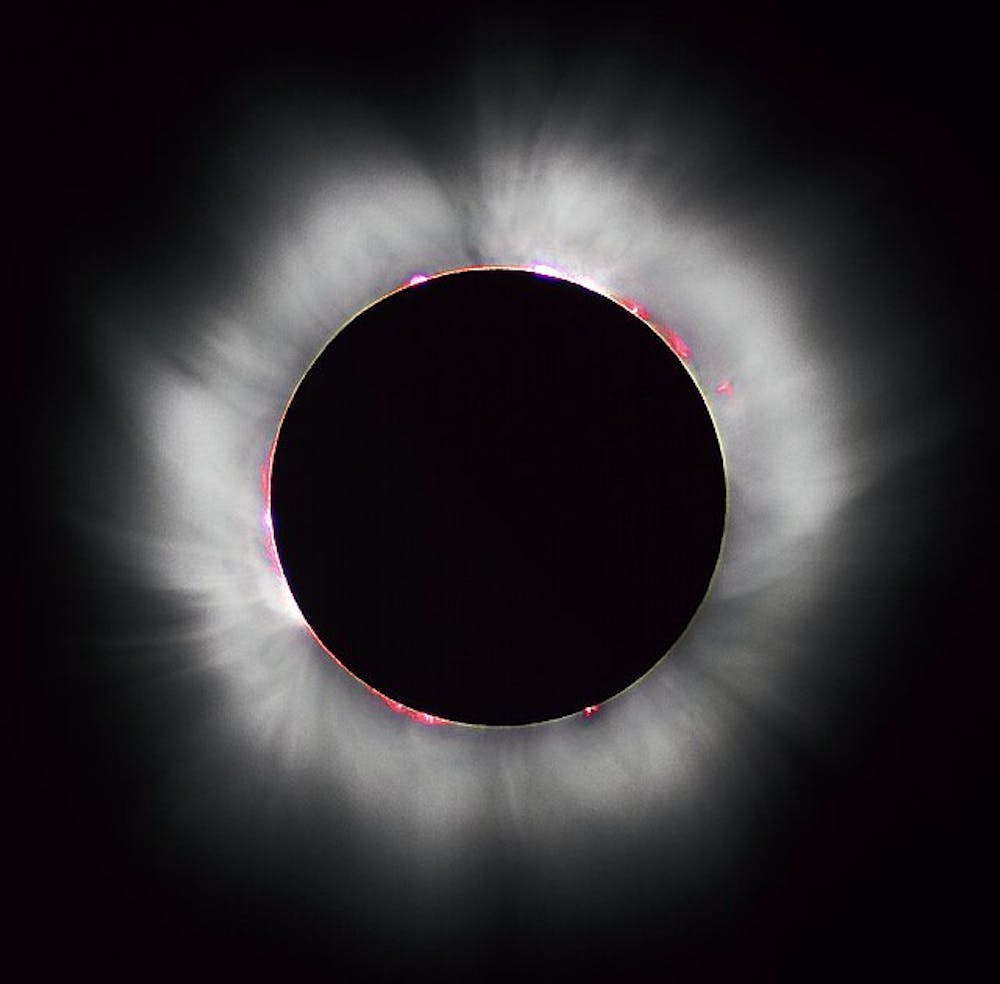For most people, Oct. 14 was just like any other fall Saturday in Buffalo. But while UB football fans kept their fingers crossed for a win, Tracy Gregg was handing out eclipse glasses to her family.
“I was like, ‘just in case!’” Gregg, who is the chair of UB’s Geological Sciences Department, said. “But no one saw it, or anything. No, too overcast.”
Partial solar eclipses occur just twice per year on average, and Oct. 14 was 2023’s last. Gloomy October weather in much of the northeast confounded any hope of sighting the phenomenon, leaving astronomy experts like Gregg disappointed.
“I was so angry all day. I was like, ‘ahhhhh!’” remarked Gregg. “Then, late that evening, it started to clear. You could actually see the sunset.”
While a total eclipse is over in a flash, a partial eclipse spans over an hour in length. And, as the moon passes in front of the sun, people watching from Earth can watch as the circle of the sun, and even the dots of dappled sunlight beneath trees, narrow to a crescent.
“When we are standing here looking toward the sun, we don't see the sun," Gregg said. “The moon is literally in the way.”
Though Saturday’s partial eclipse passed with little notice, this spring’s total eclipse will be impossible to miss. Buffalo falls directly on the path of totality — the track of the moon’s shadow — meaning people going about their day will be briefly submerged into complete darkness for two and a half otherworldly minutes on April 8, 2024.
“It's amazing. I mean, you're talking about hitting the lottery, for God's sake,” Charles Fulco, a UB alum and science teacher at the Brooklyn Friends School in New York City, said.
“It takes about 365 years, if you don't move, for an eclipse to come to you. So Buffalo's really beating the odds. The last time they had a total eclipse was 1925.”
Buffalo is expected to attract visitors from near and far: it will be the nearest major city to Toronto to see totality.
“I think they have a 98% partial, which sounds really good on paper, but it's not a good grade for an eclipse,” Fulco said of Toronto. “To me, it's either totality, you know, 100% or nothing, because the difference between even a 99.9% partial and totality is astounding.”
“It is the difference between looking out your window on an overcast day like Saturday or looking out your window in the middle of the night,” Gregg said. “Even if it's completely overcast, we will experience a full eclipse here in April.”
Gregg has pinpointed the eclipse time using the Totality app on her phone. She recalls anxiously consulting the app as she made her way to Tennessee for the last total eclipse, in August of 2017.
“I was part of what was affectionately known later as the tri-state traffic jam," she laughed. “You know, two million people try to leave Tennessee at once.”
For eclipse enthusiasts such as Fulco, the magic is worth the wait. The April total eclipse will be Fulco’s sixth, but his first, in 1991, remains his favorite.
“We were by the beach in Mexico,” Fulco recalled. “We had pigs running, confused. We had birds flying back. We had a thunderstorm on the horizon. That was really beautiful.
“We had the winter stars pop out because the sun was in Gemini, the twins next to Orion.You had all these beautiful bright stars you only normally see at nighttime during the winter, and all of a sudden they're in the daytime sky in the summer. It was just incredible.”
Fulco started a program called No Child Left Inside to ensure kids receive hands-on education outdoors as a part of their curriculum. Through the program, he hopes to foster independence, emotional and intellectual development, and a love for learning. This April, Fulco hopes teachers will cancel afternoon classes so students can view the spectacle in person.
“The thing I tell teachers and other people is that you don't miss what you don't know,” he said.
At UB, faculty are already making arrangements for a watch party this April. Amidst the excitement, however, Gregg cautions that eclipse watching without proper preparation is dangerous. Looking at the sun without eclipse glasses causes painless but irreversible damage to the retinas, which can lead to blindness.
Gregg encouraged viewers to pick up a pair of free eclipse glasses from Erie County public libraries, which are also holding viewing events. The Student Union Ticket Office is also offering the glasses while supplies last.
The news desk can be reached at news@ubspectrum.com
Hannah Rashad is the managing editor of The Spectrum.





